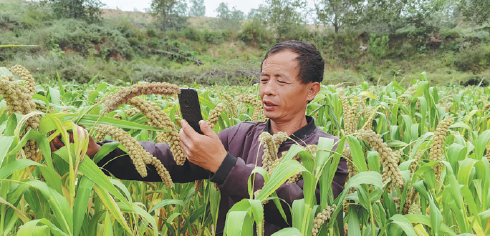Rural residents lifted out of poverty
Updated: 2020-10-16

Wei Baoyu, a farmer in Lingtou village in Wuxiang county, uses his smartphone camera to demonstrate the quality of the grain at his millet farm to online customers. [Photo by Li Yongjiang for China Daily]
Wuxiang county provides new homes, fosters innovative business practices
Wuxiang county in the east of Shanxi province used to be an important base for safeguarding the nation's security and independence some seven decades ago.
The county at the heart of Taihang Mountains was home to the headquarters of the Eighth Route Arm, the military force led by the Communist Party of China that fought against the Japanese invaders in the north of the country during the 1930s and 40s.
And today, the governments and people of Wuxiang have been devoting great efforts to winning another battle, the one against poverty.
Local statistics show that the county had 55,088 residents in 18,787 households living under the poverty line in 2014.
Over the past six years, Wuxiang has seen 51,972 of those residents lifted from poverty, almost fulfilling its target of poverty alleviation, according to the county government.
Relocating residents to new settlements and creating new business and job opportunities are among the major means for poverty reduction, according to local authorities.
In Daizhaoling village some 20 kilometers away from the county seat, the most impressive sight is a group of well laid-out new houses.
Residents from some 40 households in the village are living in the new houses, which are equipped with modern facilities such as running water and toilets and are conveniently connected by roads, electricity and telecommunications.
Wang Yuefen, a 68-year-old woman in the village, said: "It is the biggest event in my lifetime to move into the new house. It cost only 7,500 yuan ($1,110) for my family to own the new house, with every necessary facility in place."
According to Dou Yulong, Party secretary of the village, the construction of the houses and the cost involving the resettlement were mostly covered by the government.
"A resident needs to pay only 2,500 yuan to own a new house. And the maximum payment for a family is 10,000 yuan," Dou said.
Apart from the 40 families still living in the new village settlement, the other 81 households were relocated to settlements in the county seat.
"Our policy is flexible for the residents. Those who are willing to live a familiar, rural life could choose to stay and the settlements in the county seat were built for those who planned to find new business and job opportunities," Dou said.
Wang Caiping, another resident in the village, said the living conditions at present are much better than before.
"Some of the villagers used to live on the hilltops, and transport was a big problem. And the others, like my family, lived in the valleys, where flooding and soil erosion are the major threats during the rainy season," Wang said.
"Dirt piled up in front of our houses blocked the doors after heavy rains. And now we are freed from the labor of clearing dirt because our new settlement was built in a safer place."
During the 13th Five-Year Plan period (2016-20), the government of Wuxiang county has invested a total of 380 million yuan in renovating rural residences and building new settlements, according to local officials, who added that more than 1,200 impoverished households have been relocated to 23 new settlements.
In Lingtou, another village in Wuxiang county, local authorities have encouraged farmers to use e-commerce platforms to create new business opportunities.
Now when Wei Baoyu, a local farmer, goes to work on his millet farm, he brings with him a mobile phone for livestreaming.
Over the past four years, the farmer has grown into an experienced salesman, using various internet platforms to promote his produce.
"When a harvest is approaching, it's the best chance to show the quality of the millet to the buyers.
"I show them the size of the grain and the organic fertilizers piled beside the field. This is the best demonstration for those who really want to buy high-quality, organic food,"Wei said.
Through livestreaming, Wei has received orders from across the country and even overseas.
And the price has increased from about 8 yuan a kilogram to nearly 40 yuan a kilo to match the product's status as organic.
"At the beginning, I was regarded an idler by other villagers as they saw me taking pictures on the farm. But when they realized I really made a fortune, they came to ask me how to sell products through e-commerce," Wei said.
Led by Wei, more villagers have tried new ways to do business. A total of 80 households have developed into online dealers, selling various local produce.
According to the local villagers' committee, total revenue generated from online sales amounted 1 million yuan last year in the village with a population of 504.
In Wuxiang county, there are 5,500 dealers doing business on various e-commerce platforms, with online transaction value totaling 280 million yuan last year. And the online businesses brought some 3.5 million yuan to more than 2,300 impoverished households, according to the county government of Wuxiang.
Xie Yan contributed to this story.



